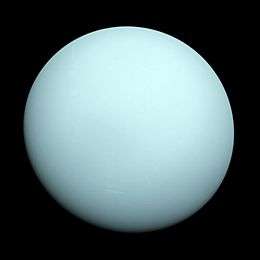Belinda (moon)
|
Belinda viewed by Voyager 2 in 1986 | |
| Discovery | |
|---|---|
| Discovered by | Stephen P. Synnott / Voyager 2 |
| Discovery date | January 13, 1986 |
| Orbital characteristics | |
Mean orbit radius | 75,255.613 ± 0.057 km[1] |
| Eccentricity | 0.00007 ± 0.000073[1] |
| 0.623527470 ± 0.000000017 d[1] | |
| Inclination | 0.03063 ± 0.028° (to Uranus' equator)[1] |
| Satellite of | Uranus |
| Physical characteristics | |
| Dimensions | 128 × 64 × 64 km[2] |
Mean radius | 40.3 ± 8 km[2][3][4] |
| ~25,000 km² [lower-alpha 1] | |
| Volume | ~380,000 km³ [lower-alpha 1] |
| Mass | ~3.6×1017 kg[lower-alpha 1] |
Mean density | ~1.3 g/cm³ (assumed)[3] |
| ~0.014 m/s² [lower-alpha 1] | |
| ~0.034 km/s[lower-alpha 1] | |
| synchronous[2] | |
| zero[2] | |
| Albedo | 0.08 ± 0.01[5] |
| Temperature | ~64 K[lower-alpha 1] |
|
| |
Belinda (/bᵻˈlɪndə/ bə-LIN-də) is an inner satellite of the planet Uranus. Belinda was discovered from the images taken by Voyager 2 on 13 January 1986 and was given the temporary designation S/1986 U 5.[6] It is named after the heroine of Alexander Pope's The Rape of the Lock. It is also designated Uranus XIV.[7]
Belinda belongs to the Portia group of satellites, which also includes Bianca, Cressida, Desdemona, Portia, Juliet, Cupid, Rosalind and Perdita.[5] These satellites have similar orbits and photometric properties.[5] Other than its orbit,[1] radius of 45 km[2] and geometric albedo of 0.08[5] virtually nothing is known about it.
The Voyager 2 images show Belinda as an elongated object with its major axis pointing towards Uranus. The moon is very elongated, with its short axis 0.5 ± 0.1 times the long axis.[2] Its surface is grey in color.[2]
See also
References
Explanatory notes
Citations
Sources
- Jacobson, R. A. (1998). "The Orbits of the Inner Uranian Satellites From Hubble Space Telescope and Voyager 2 Observations". The Astronomical Journal. 115 (3): 1195–1199. Bibcode:1998AJ....115.1195J. doi:10.1086/300263.
- Karkoschka, Erich (2001). "Voyager's Eleventh Discovery of a Satellite of Uranus and Photometry and the First Size Measurements of Nine Satellites". Icarus. 151 (1): 69–77. Bibcode:2001Icar..151...69K. doi:10.1006/icar.2001.6597.
- "Planetary Satellite Physical Parameters". JPL (Solar System Dynamics). 18 October 2010. Retrieved 2012-01-27.
- Williams, Dr. David R. (23 November 2007). "Uranian Satellite Fact Sheet". NASA (National Space Science Data Center). Retrieved 2012-01-27.
- Karkoschka, Erich (2001). "Comprehensive Photometry of the Rings and 16 Satellites of Uranus with the Hubble Space Telescope". Icarus. 151 (1): 51–68. Bibcode:2001Icar..151...51K. doi:10.1006/icar.2001.6596.
- Marsden, Brian G. (1986-01-16). "Satellites of Uranus". IAU Circular. 4164. Retrieved 2012-01-27.
- USGS/IAU (July 21, 2006). "Planet and Satellite Names and Discoverers". Gazetteer of Planetary Nomenclature. USGS Astrogeology. Retrieved 2012-01-27.


